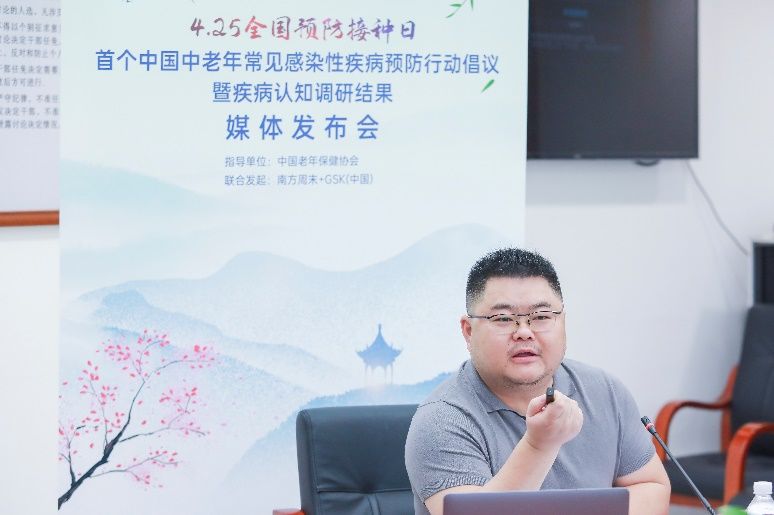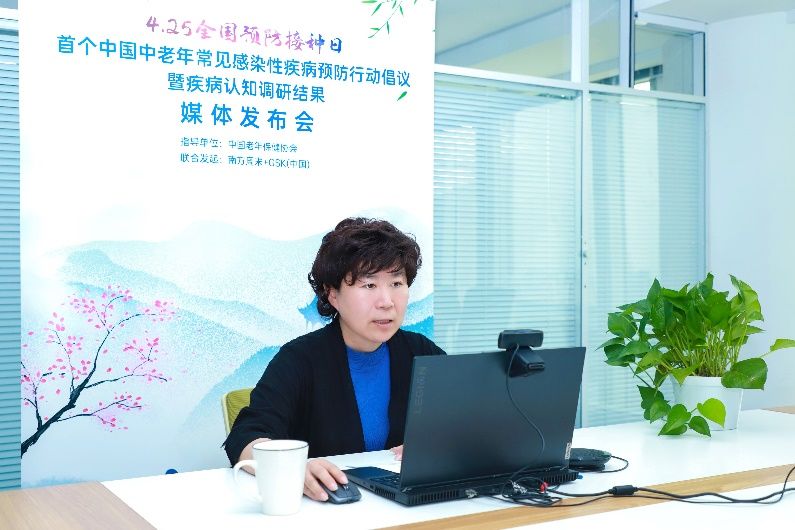April 25th every year is the “National Vaccination Day”. Under the guidance of the China Elderly Health Care Association, Southern Weekly and GSK China jointly launched and announced the “China Middle-aged and Elderly Common Infectious Disease Prevention Action Initiative and Cognitive Survey Results”, which aims to emphasize the importance of proactively preventing common infectious diseases in the middle-aged and the elderly, and calls on the middle-aged and elderly to take vaccinations as soon as possible to prevent common infectious diseases, reduce the risk of infectious diseases and their related complications, and through Infection prevention slows the progression of chronic disease or the risk of death in older adults.
The survey data shows that the middle-aged and elderly people (50 years old and above) underestimate the risk and harm of common infectious diseases, and the awareness of disease prevention needs to be improved. Over 80% of the respondents chose a good lifestyle (strengthening body, balanced diet, combination of work and rest, etc.) as the first choice for disease prevention, followed by vaccination. However, if people who have experienced infectious diseases can choose again, more than 60% of the middle-aged and elderly people hope to take measures in advance to actively prevent vaccination.
Middle-aged and elderly people underestimate the risk and harm of common infectious diseases, and healthy China insists on prevention

At the meeting, in view of the main data of the survey results, Meng Dengke, Deputy General Manager of Southern Weekend, Vice President and Secretary General of Southern Weekend Research Institute, introduced: “The survey is aimed at the public and middle-aged and elderly people on the common infectious diseases and hazards of middle-aged and elderly people. Cognition, awareness of relevant prevention methods, and vaccination actions. It was found that the awareness rate, willingness rate and action rate of vaccination among the middle-aged and elderly are decreasing gradually: over 70% of middle-aged and elderly people are They believe that vaccination against herpes zoster vaccine, influenza vaccine and pneumococcal pneumonia vaccine can prevent related infectious diseases. The proportion of vaccines is only 37%only 37%, the urgency and action of the middle-aged and elderly people to actively prevent common infectious diseases need to be improved.”< /span>
In addition, in terms of cognition, survey results show thatmost middle-aged and elderly people are worried about complications caused by common infectious diseases and aggravation of existing diseases. Chronic diseases, but middle-aged and older people generally underestimate the risk of pneumococcal pneumonia and herpes zoster in this age group.

Yu Hua, Vice President and Secretary General of the China Association for Aged Health Care, said: “Healthy China 2030 points out that prevention is the priority and the incidence of diseases is reduced. The Aging Plan emphasizes the quality of life and uses medical and health care to prevent diseases in advance. Infectious diseases have high morbidity and mortality among the elderly, which seriously affect the quality of life of the elderly and cause a heavy economic burden. Therefore, we It is necessary to increase the awareness, urgency and action of the people on the prevention of common infectious diseases among middle-aged and elderly people as soon as possible.”
After experiencing the pain, over 60% of middle-aged and elderly people are willing to “rewind” vaccination
Surveys show that most people who experience pain “regret” and underestimate the impact of common infectious diseases. Taking herpes zoster as a prominent feature of pain, for example, postherpetic neuralgia is the most common complication of herpes zoster. Symptoms of long-term pain, repeated pain and impact on life. In fact, Du Xueping, president of the General Practitioners Branch of the Chinese Medical Doctor Association, said, “The pain associated with herpes zoster can run through the disease, and 30%-50% of patients with postherpetic neuralgia suffer from pain for more than one year, and some for up to 10 years. .”
Middle-aged and elderly people are more likely to trust the advice of professionals and advocate early action for prevention
Meng Dengke said that the promotion of disease prevention awareness among middle-aged and elderly people is inseparable from the promotion of popular science by medical professionals. In the survey of factors affecting the active vaccination of middle-aged and elderly people, trusting the advice of medical professionals (40%), one’s own perception of the disease (31%), and the influence of people around them (30%) ranked the top three. In addition, compared with other cities, first- and second-tier cities have higher awareness and accessibility of vaccination against common infectious diseases.
As one of the co-sponsors, Feng Bixia, Vice President of GlaxoSmithKline and head of China’s vaccine business, said: “As the world’s leading vaccine company, GlaxoSmithKline has more than 20 vaccines worldwide. In China, GSK SuSmithKline is committed to bringing innovative products, expanding the vaccine portfolio, and striving to increase the awareness and accessibility of vaccination, and support the promotion of common infectious disease prevention, from sinking communities across the country, from awareness to action.”< /p>
The “Health Protection Initiative for the Elderly in my country” advocates actively responding to the national call for vaccination against COVID-19; active vaccination against influenza, Streptococcus pneumoniae and shingles. It is suggested that in addition to regular work and rest, balanced nutrition, and scientific exercise, middle-aged and elderly people should also be actively vaccinated to reduce the risk of infectious diseases and related complications, and slow the progression of chronic diseases in the elderly through infection prevention.
(China Daily Shanghai Branch)